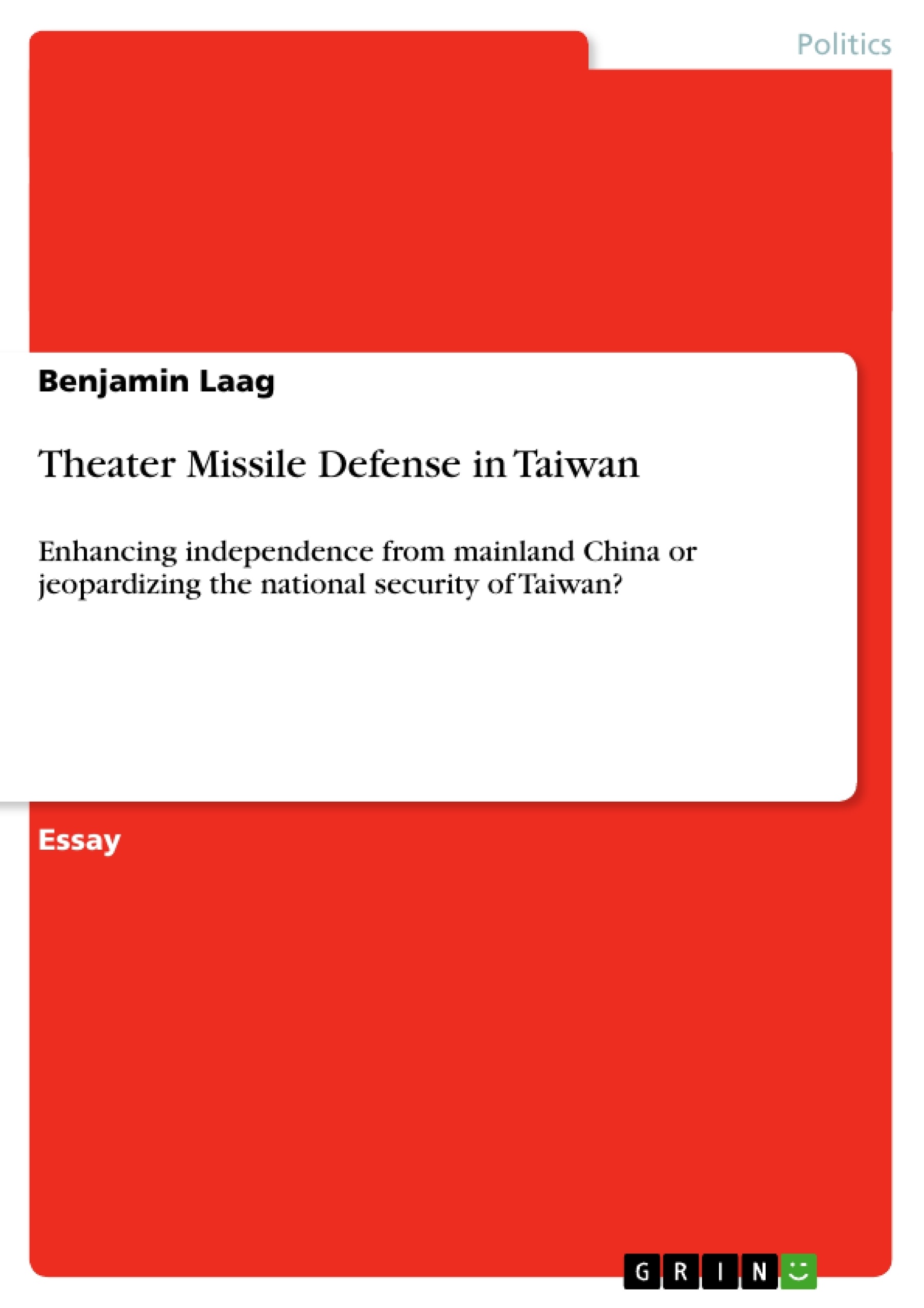Das Thema Raketenabwehr wird vorrangig mit den amerikanischen Stationierungsplänen für Polen und die Tschechische Republik in Verbindung gebracht. Trotz vergleichbarer sicherheitspolitischer Relevanz spielt das ebenfalls von den USA unterstütze Raketenabwehrsystem auf Taiwan in den westlichen Medien keine wesentliche Rolle. Während sich Taiwan besseren Schutz vor chinesischen Raketenangriffen verspricht, betrachtet China eine taiwanesische Raketenabwehr als einen weiteren Schritt der "abtrünnigen Provinz" in Richtung formale Unabhängigkeit. Die Analyse der regionalen sowie globalen Implikationen ergibt, dass ein Raketenabwehrsystem auf Taiwan geringen militärischen Nutzen aufweist und die Beziehungen zwischen den USA und China destabilisiert.
Inhaltsverzeichnis (Table of Contents)
- Introduction
- Mainland China-Taiwan Relations
- National security of Taiwan
- Why China cannot let go
- The strategic ambiguity of the USA
- Theater Missile Defense in Taiwan
- Conclusion
Zielsetzung und Themenschwerpunkte (Objectives and Key Themes)
This article aims to explore the regional and global implications of a Taiwanese Theater Missile Defense (TMD) system, focusing on whether it enhances Taiwan's national security and independence. It examines the role of the TMD system in deterring potential military action from mainland China, the complex dynamics of U.S. involvement in the region, and the implications of missile defense for Taiwanese threat perception.
- The impact of a Taiwanese TMD system on mainland China's military capabilities and strategy
- The complexities of U.S. involvement in the Taiwan Strait and the strategic ambiguity of U.S. support for a Taiwanese TMD
- The role of missile defense in Taiwanese threat perception and its actual military merit
- The potential consequences of a TMD system for Taiwanese independence and regional stability
Zusammenfassung der Kapitel (Chapter Summaries)
The article begins by outlining the historical context of mainland China-Taiwan relations, emphasizing the ongoing debate over Taiwan's future status. It highlights the significance of the 1995-1996 Taiwan Strait crisis in prompting demands for a more sophisticated TMD system. The article then delves into the dynamics of Taiwan's national security, exploring the threats posed by mainland China and the strategic importance of the island to the United States. It examines the rationale behind China's unwavering commitment to reunifying Taiwan with the mainland, emphasizing the threat posed by Taiwan's independence to the legitimacy of the Chinese government.
The article further examines the complexities of U.S. involvement in the Taiwan Strait, highlighting the strategic ambiguity of U.S. support for a Taiwanese TMD system. It discusses the potential implications of a TMD system for Taiwanese threat perception and its actual military merit. The article concludes by examining the potential for a TMD system to enhance Taiwanese independence or trigger regional conflict, emphasizing the intricate interplay of interests between mainland China, Taiwan, and the United States.
Schlüsselwörter (Keywords)
This article focuses on the intersection of Taiwan's independence, mainland China's military capabilities, and U.S. foreign policy. It explores the implications of a Theater Missile Defense (TMD) system for Taiwan's security and the stability of the region. Key concepts discussed include the 'one China' principle, strategic ambiguity, missile defense, and the Taiwan Strait crisis.
Frequently Asked Questions
What is the main objective of the article on Taiwan's Missile Defense?
The article explores the regional and global implications of a Taiwanese Theater Missile Defense (TMD) system and whether it truly enhances Taiwan's security.
How does mainland China view Taiwan's TMD system?
China considers the missile defense system as a step toward formal independence for what it calls the "renegade province," which destabilizes relations.
What role does the United States play in Taiwan's missile defense?
The U.S. supports the system but maintains a policy of "strategic ambiguity" regarding its involvement in the Taiwan Strait.
Did the 1995-1996 Taiwan Strait crisis affect defense demands?
Yes, the crisis was a significant factor in prompting demands for a more sophisticated Theater Missile Defense system in Taiwan.
Does the TMD system provide significant military benefits according to the analysis?
The analysis suggests that the TMD system has low actual military merit and serves more as a factor in threat perception and political signaling.
- Quote paper
- Benjamin Laag (Author), 2008, Theater Missile Defense in Taiwan, Munich, GRIN Verlag, https://www.grin.com/document/128410



